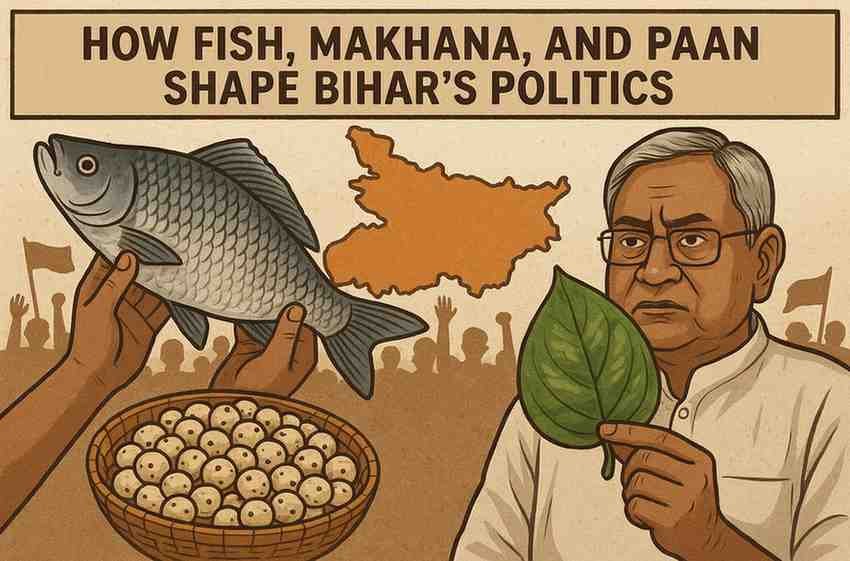Everyday Culture Meets Electoral Strategy
In Bihar, politics is not only fought through rallies, roadshows, and fiery speeches. It is also reflected in everyday culture—particularly in the state’s love for machhli (fish), makhana (fox nut), and paan (betel leaf). These three items are more than just food—they define identity, livelihood, and belonging. Every election season, they find their way into political promises, campaign slogans, and community feasts.
Fish: The Symbol of Livelihood and Unity
Fish is not just a staple food in Bihar; it is a way of life. In North Bihar—districts like Darbhanga, Samastipur, and Muzaffarpur—no major event is complete without machhli-bhaat (fish and rice). Weddings, festivals, and village gatherings revolve around this dish, making it a cultural anchor for communities.
Thousands of families depend on fishing for survival, particularly those from the Mallah and Nishad communities. These groups have gained political significance over time, and every major party—from JD(U) to RJD and BJP—seeks their support. Promises to improve ponds, build hatcheries, and modernize fish markets often feature in campaign speeches.
Mukesh Sahni, leader of the Vikassheel Insaan Party, built his identity on being the “son of the Mallah.” His rise proved how powerful this symbol could be. When politicians share a meal of fish with locals, it sends a strong message of inclusion—“We are one of you.”
Makhana: Pride of Mithila and Proof of Progress
If fish connects people through rivers, makhana connects them through ponds. Bihar produces over 90% of India’s makhana, mainly in the Mithilanchal region—Darbhanga, Madhubani, Supaul, and Saharsa. For lakhs of farmers here, makhana is not only a source of income but a matter of pride.
The Nitish Kumar government has taken several initiatives to promote makhana. The crop received a Geographical Indication (GI) tag, a Makhana Research Centre was set up in Darbhanga, and support for exports increased. These steps turned makhana into a political talking point and a symbol of local development.
During elections, national leaders like Prime Minister Narendra Modi have referred to makhana as a model of Bihar’s progress. For the youth, makhana represents hope—a traditional product going global, creating new jobs, and inspiring self-reliance. In Mithilanchal, invoking makhana in political speeches connects directly with regional pride and aspirations.
Paan: The Cultural Connector of Bihar
If fish and makhana speak of work and prosperity, paan speaks of emotion and culture. The Magahi paan of Gaya and Mithilanchal paan of Darbhanga are famous nationwide. Offering paan is considered a mark of respect, and paan stalls are the social nerve centres of Bihar’s towns and villages.
These shops are not just for chewing betel leaves—they are hubs of conversation, debate, and gossip. During election season, paan stalls turn into miniature political forums where people discuss candidates and policies. Politicians often stop by these shops, chatting casually with locals, understanding sentiments, and posing for pictures—a symbolic act that bridges class and community gaps.
The paan trade sustains thousands of families in central Bihar. Farmers often demand better irrigation, crop insurance, and market access. Leaders who address these issues win trust easily. Even today, exchanging paan between leaders and voters signifies shared identity and mutual respect.
The Political Taste of Tradition
Together, machhli, makhana, and paan represent Bihar’s social and cultural essence. They connect voters with their roots and give politicians a relatable platform to discuss development. While national leaders may focus on big-ticket reforms, local candidates win hearts by promising fish seed centres, makhana processing units, or paan cooperatives.
These industries collectively generate trade worth over Rs 8,000 crore annually, supporting nearly 20 lakh people. Their concerns—fair pricing, better infrastructure, and government support—form a vital part of Bihar’s electoral discourse.
As the next election approaches, expect these three icons to dominate once again. Fish will be served at community feasts, makhana will feature in campaign gifts, and paan will be shared in countless tea-stall discussions. In a land where food, emotion, and politics intertwine, machhli, makhana, and paan will continue to flavour Bihar’s political story.







